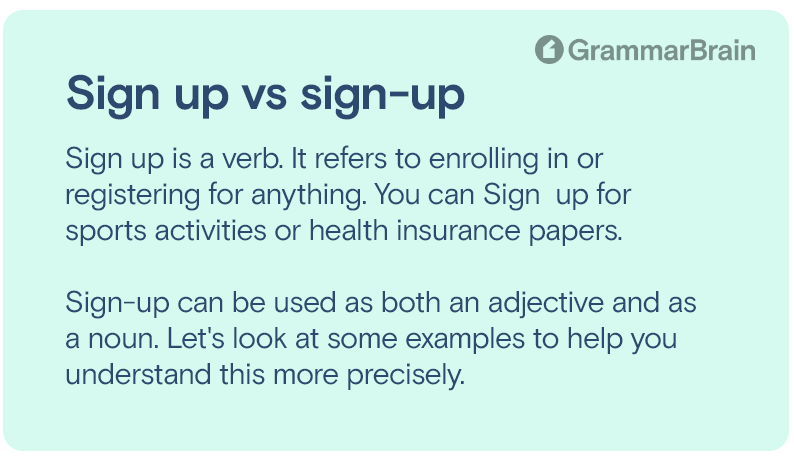Is it sign-up, signup, or sign up? English is a versatile language, and one of the most crucial techniques for obtaining this versatility is hyphenation. We may combine many words to generate new descriptions or even turn verb phrases into adjectives and nouns by adding a hyphen.
You may accomplish this by hyphenating the phrasal verb sign up. However, many authors are unsure about the right use between sign up and sign-up.
Misuse generates uncertainty because the grammar rules around hyphenation aren’t always clear. That being said, let’s look closer at these two words to clarify things up.

What is the Difference between Sign up vs. Sign-up vs. Signup?
When Should You Use Sign Up?
Sign up is a verb. It refers to enrolling in or registering for anything. You can Sign up for sports activities or health insurance papers. Here are some examples to understand this concept in a better way.
- If you sign up for football, you can’t sign up for a cricket tournament.
- Since our married life is not going well, my neighbor recommended my husband and me sign up for marriage counseling.
- Have you watched the new game of thrones season? If not, go and sign up for a Hotstar subscription and binge-watch it.
When Should You Use Sign-Up?
Sign-up can be used as both an adjective and as a noun. Let’s look at some examples to help you understand this more precisely.
- Sign-ups for the cricket tournament will close at the conclusion of the day.
- The gymnasium hosts sign-ups for student organizations to participate in various sports activities.
Sign-up, as an adjective, modifies a noun, often as an object used for registration for something. Following are some more examples to understand this.
- The workplace pension scheme is open for enrolment using an online sign-up form available from October 26 to December 11 this year.
- We have no clue who will provide dinner for this weekend’s staff birthday celebration because Kate misplaced the sign-up sheets.
- I was browsing the internet when I saw that the web development manager position comes with a $600 sign-up bonus.
When Should You Use Sign-Up (as a noun)?
This variant of the phrase is a noun. It refers to a sheet of paper, or a website, as examples, where people may sign up.
It may also be employed as an adjective to change the sheet of paper, website, etc., where the signup is taking place. Let’s look at one example that will help you understand the concept much better.
- Example (Noun): All registered users can signup on the website.
- Example (Adjective): The signup webpage crashed due to too many people signing up simultaneously.
Tips for remembering the difference between all these terms
It’s pretty much easy to distinguish between sign-up and sign up since they are two separate components of speech.
Sign up serves as a verb phrase. Whereas, Sign-up serves the purpose of both adjective and a noun. Remember that there are several other hyphenated adjectives, such as front-loaded, wine-soaked, and burger-munching, to remind you that sign-up is the adjective form. This word’s hyphen serves as a hint that it is an adjective.
Conclusion
Despite having the same characters in all words, their punctuation gives them contrasting parts of speech.
According to proper punctuation, the unhyphenated sign up should only be employed as a verb, while the hyphenated sign up should only be employed as an adjective.
Inside this article
Fact checked:
Content is rigorously reviewed by a team of qualified and experienced fact checkers. Fact checkers review articles for factual accuracy, relevance, and timeliness. Learn more.
Core lessons
Glossary
- Abstract Noun
- Accusative Case
- Anecdote
- Antonym
- Active Sentence
- Adverb
- Adjective
- Allegory
- Alliteration
- Adjective Clause
- Adjective Phrase
- Ampersand
- Anastrophe
- Adverbial Clause
- Appositive Phrase
- Clause
- Compound Adjective
- Complex Sentence
- Compound Words
- Compound Predicate
- Common Noun
- Comparative Adjective
- Comparative and Superlative
- Compound Noun
- Compound Subject
- Compound Sentence
- Copular Verb
- Collective Noun
- Colloquialism
- Conciseness
- Consonance
- Conditional
- Concrete Noun
- Conjunction
- Conjugation
- Conditional Sentence
- Comma Splice
- Correlative Conjunction
- Coordinating Conjunction
- Coordinate Adjective
- Cumulative Adjective
- Dative Case
- Determiner
- Declarative Sentence
- Declarative Statement
- Direct Object Pronoun
- Direct Object
- Diction
- Diphthong
- Dangling Modifier
- Demonstrative Pronoun
- Demonstrative Adjective
- Direct Characterization
- Definite Article
- Doublespeak
- False Dilemma Fallacy
- Future Perfect Progressive
- Future Simple
- Future Perfect Continuous
- Future Perfect
- First Conditional
- Irregular Adjective
- Irregular Verb
- Imperative Sentence
- Indefinite Article
- Intransitive Verb
- Introductory Phrase
- Indefinite Pronoun
- Indirect Characterization
- Interrogative Sentence
- Intensive Pronoun
- Inanimate Object
- Indefinite Tense
- Infinitive Phrase
- Interjection
- Intensifier
- Infinitive
- Indicative Mood
- Participle
- Parallelism
- Prepositional Phrase
- Past Simple Tense
- Past Continuous Tense
- Past Perfect Tense
- Past Progressive Tense
- Present Simple Tense
- Present Perfect Tense
- Personal Pronoun
- Personification
- Persuasive Writing
- Parallel Structure
- Phrasal Verb
- Predicate Adjective
- Predicate Nominative
- Phonetic Language
- Plural Noun
- Punctuation
- Punctuation Marks
- Preposition
- Preposition of Place
- Parts of Speech
- Possessive Adjective
- Possessive Determiner
- Possessive Case
- Possessive Noun
- Proper Adjective
- Proper Noun
- Present Participle
- Prefix
- Predicate



